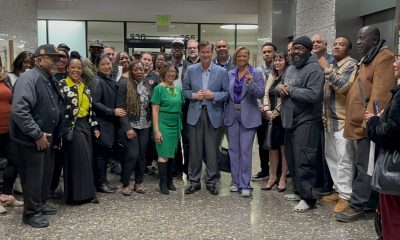Activism
Community and Developers Ask: Why Is There so Little Money in the City’s Affordable Housing Fund?

Where have the city’s funds for affordable housing gone?
That’s a question City Council President Rebecca Kaplan and council members want to answer as they look at why there is so little money in the city’s affordable housing trust fund at a time when booming high end construction in Oakland should be generating many millions of dollars in “impact fees” that housing developers are required to pay to avoid building a certain percentage of affordable units on a project.
Since 2016 when impact fees went into effect, the fund has only collected $8.8 million, according to a city report. Of this money, the city has committed $4.9 million to three affordable housing developments, totaling 162 units that not yet completed.
However, the city since 2016 has issued about 10,000 building permits that are moving ahead and are expected to build more than 17,000 new units by 2024, which means that city officials could have collected an estimated $25 million in impact fees in the past four years and, as much as $50 million as the projects move toward completion.
Impact fees can cost developers between $5,000 to $24,000 for each market rate unit they build, depending on the location of the project and when the permits were issued.
In response to questions raised by Council members Kaplan, Nikki Fortunato-Bas and others, the city administration has hired an independent analyst to audit the fund and improve procedures for collecting the money.
“These are steps in the right direction, but if we are to truly meet our goal of 4,760 affordable homes by 2024 (we are at 751), we must most aggressively enact policies and procedures that accelerate affordable housing creation and funding,” said Kaplan in a letter to the council and the public.
Speaking at Wednesday evenings council meeting, Assistant City Administrator Marasheshia Smith said the full report on impact fees would be available in the spring.
“We don’t think there are missing funds,” she said, pointing out that her department is short staffed and that most of current staff members, including herself, are new. “We are trying to understand what processes were put in place to account for the funds…We would like an audit because we’d like to see some process improvement.”
Jeffrey Levin of East Bay Housing Organizations (EBHO), speaking at last week’s Community and Economic Development (CED) Committee meeting, said impact fees were supposed to be a way for the city to get private developers to help pay for affordable housing.
“It is shameful that the city cannot explain how it is in an unprecedented building boom (that) we have so little money to show for it,” Levin said. “Something is just not adding up, We don’t know what’s wrong, but nobody can explain it either, and we wait and we wait, and that waiting is not without consequence.”
“We raised this issue in January, we raised it again in May, (and) we were assured that in a couple of months an accounting would be done … Now we’re being told it will be March, April or April or May (2020) before we can see the numbers. That is just not good enough…There is no accountability and no transparency,” said Levin.
Representing developers, Greg McConnell of the Oakland Jobs and Housing Coalition said that affordable housing advocates are not the only ones who want to know what has happened to the funds.
“Developers are pretty interested in this too,” he said.
McConnell added that developers served on the Mayor’s Housing Cabinet, served on commissions and boards and helped develop the impact fee ordinance. “Little did we know it would be years down the road trying to figure where the money went. It’s a cause of great concern,” he said. “(Developers) who helped put all these cranes up that you see they have put money into the city, and the money hasn’t been spent, and the housing crisis goes unabated.”
Stevi Dawson of EBHO thanked Council President Kaplan for pushing the city to produce a report on the fees. “If she hadn’t intervened, we’d still be asking for this staff report. We need more transparency. We do not need to spend a year and a half asking for something that should be published (every year). There should be a yearly accounting.”
Activism
OP-ED: AB 1349 Puts Corporate Power Over Community
Since Ticketmaster and Live Nation merged in 2010, ticket prices have jumped more than 150 percent. Activities that once fit a family’s budget now take significant disposable income that most working families simply don’t have. The problem is compounded by a system that has tilted access toward the wealthy and white-collar workers. If you have a fancy credit card, you get “presale access,” and if you work in an office instead of a warehouse, you might be able to wait in an online queue to buy a ticket. Access now means privilege.

By Bishop Joseph Simmons, Senior Pastor, Greater St. Paul Baptist Church, Oakland
As a pastor, I believe in the power that a sense of community can have on improving people’s lives. Live events are one of the few places where people from different backgrounds and ages can share the same space and experience – where construction workers sit next to lawyers at a concert, and teenagers enjoy a basketball game with their grandparents. Yet, over the past decade, I’ve witnessed these experiences – the concerts, games, and cultural events where we gather – become increasingly unaffordable, and it is a shame.
These moments of connection matter as they form part of the fabric that holds communities together. But that fabric is fraying because of Ticketmaster/Live Nation’s unchecked control over access to live events. Unfortunately, AB 1349 would only further entrench their corporate power over our spaces.
Since Ticketmaster and Live Nation merged in 2010, ticket prices have jumped more than 150 percent. Activities that once fit a family’s budget now take significant disposable income that most working families simply don’t have. The problem is compounded by a system that has tilted access toward the wealthy and white-collar workers. If you have a fancy credit card, you get “presale access,” and if you work in an office instead of a warehouse, you might be able to wait in an online queue to buy a ticket. Access now means privilege.
Power over live events is concentrated in a single corporate entity, and this regime operates without transparency or accountability – much like a dictator. Ticketmaster controls 80 percent of first-sale tickets and nearly a third of resale tickets, but they still want more. More power, more control for Ticketmaster means higher prices and less access for consumers. It’s the agenda they are pushing nationally, with the help of former Trump political operatives, who are quietly trying to undo the antitrust lawsuit launched against Ticketmaster/Live Nation under President Biden’s DOJ.
That’s why I’m deeply concerned about AB 1349 in its current form. Rather than reining in Ticketmaster’s power, the bill risks strengthening it, aligning with Trump. AB 1349 gives Ticketmaster the ability to control a consumer’s ticket forever by granting Ticketmaster’s regime new powers in state law to prevent consumers from reselling or giving away their tickets. It also creates new pathways for Ticketmaster to discriminate and retaliate against consumers who choose to shop around for the best service and fees on resale platforms that aren’t yet controlled by Ticketmaster. These provisions are anti-consumer and anti-democratic.
California has an opportunity to stand with consumers, to demand transparency, and to restore genuine competition in this industry. But that requires legislation developed with input from the community and faith leaders, not proposals backed by the very company causing the harm.
Will our laws reflect fairness, inclusion, and accountability? Or will we let corporate interests tighten their grip on spaces that should belong to everyone? I, for one, support the former and encourage the California Legislature to reject AB 1349 outright or amend it to remove any provisions that expand Ticketmaster’s control. I also urge community members to contact their representatives and advocate for accessible, inclusive live events for all Californians. Let’s work together to ensure these gathering spaces remain open and welcoming to everyone, regardless of income or background.
Activism
Oakland Post: Week of December 31, 2025 – January 6, 2026
The printed Weekly Edition of the Oakland Post: Week of – December 31, 2025 – January 6, 2026

To enlarge your view of this issue, use the slider, magnifying glass icon or full page icon in the lower right corner of the browser window.
Activism
Big God Ministry Gives Away Toys in Marin City
Pastor Hall also gave a message of encouragement to the crowd, thanking Jesus for the “best year of their lives.” He asked each of the children what they wanted to be when they grow up.

By Godfrey Lee
Big God Ministries, pastored by David Hall, gave toys to the children in Marin City on Monday, Dec. 15, on the lawn near the corner of Drake Avenue and Donahue Street.
Pastor Hall also gave a message of encouragement to the crowd, thanking Jesus for the “best year of their lives.” He asked each of the children what they wanted to be when they grew up.
Around 75 parents and children were there to receive the presents, which consisted mainly of Gideon Bibles, Cat in the Hat pillows, Barbie dolls, Tonka trucks, and Lego building sets.
A half dozen volunteers from the Big God Ministry, including Donnie Roary, helped to set up the tables for the toy giveaway. The worship music was sung by Ruby Friedman, Keri Carpenter, and Jake Monaghan, who also played the accordion.
Big God Ministries meets on Sundays at 10 a.m. at the Mill Valley Community Center, 180 Camino Alto, Mill Valley, CA Their phone number is (415) 797-2567.
-

 Bay Area4 weeks ago
Bay Area4 weeks agoPost Salon to Discuss Proposal to Bring Costco to Oakland Community meeting to be held at City Hall, Thursday, Dec. 18
-

 Activism4 weeks ago
Activism4 weeks agoMayor Lee, City Leaders Announce $334 Million Bond Sale for Affordable Housing, Roads, Park Renovations, Libraries and Senior Centers
-

 Activism4 weeks ago
Activism4 weeks agoOakland School Board Grapples with Potential $100 Million Shortfall Next Year
-

 Activism4 weeks ago
Activism4 weeks ago2025 in Review: Seven Questions for Black Women’s Think Tank Founder Kellie Todd Griffin
-

 Arts and Culture4 weeks ago
Arts and Culture4 weeks agoFayeth Gardens Holds 3rd Annual Kwanzaa Celebration at Hayward City Hall on Dec. 28
-

 Advice4 weeks ago
Advice4 weeks agoCOMMENTARY: If You Don’t Want Your ‘Black Card’ Revoked, Watch What You Bring to Holiday Dinners
-

 Activism4 weeks ago
Activism4 weeks agoAnn Lowe: The Quiet Genius of American Couture
-

 Activism3 weeks ago
Activism3 weeks agoDesmond Gumbs — Visionary Founder, Mentor, and Builder of Opportunity





















































